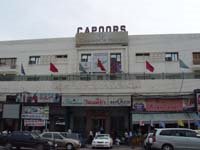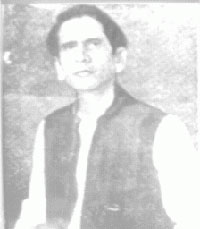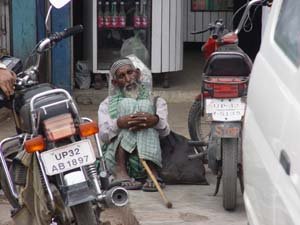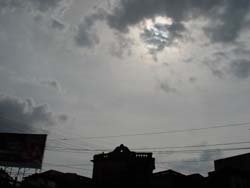For a man who no longer has a homeland, writing becomes a place to live: Theodor Adorno
Two days ago I saw
My land like a tourist
On the Discovery channel
My father shouted and
Told my niece:
Look that is the Dal lake
Where lotus stems come from
In his shikara
Gulla carried
Bunches of Narcissus
Which we would decorate
In a brass plate
Along with a pen
And a coin to
Welcome the spring
Now springs are spent
In colouring rusted coolers
To enable them to
Provide succour in heat
Relatives from Jammu
Arrive every few months
Bringing with them
Souvenirs of my land
Green saag with roots
And local sesame bread
My father and mother
Arrived in Delhi
A few years ago
From Jammu
And now when
He refers to Jammu
My father says:
Back in Srinagar
And then he stops
When he realises
That Srinagar was
What he left
Sixteen years ago
And then for days
He keeps silent
He keeps on staring
At the ceiling
He also does not
Then read newspapers
Tuesday, August 29, 2006
Friday, August 25, 2006
Monaco Biscuits
You have retained
Your habit of making
Caricatures when you
Do not bother
To listen to
What a speaker
Has to say
The free strands
Of your hair
Look like Vincent’s
Corn-field and
Your worn-out
Canvas shoes
Like his canvas
You wear
A silver ring
On the little finger
Of your right hand
Through which I desire
To pass like a
Pashmina shawl
When you entered
Yesterday into
The array of my vision
You passed your
First glance at me
How I wished
I had a beard
I also heard
You telling your
Friend that you
Were hungry
I could have fed you
My liver instead of
Those Monaco biscuits
Your habit of making
Caricatures when you
Do not bother
To listen to
What a speaker
Has to say
The free strands
Of your hair
Look like Vincent’s
Corn-field and
Your worn-out
Canvas shoes
Like his canvas
You wear
A silver ring
On the little finger
Of your right hand
Through which I desire
To pass like a
Pashmina shawl
When you entered
Yesterday into
The array of my vision
You passed your
First glance at me
How I wished
I had a beard
I also heard
You telling your
Friend that you
Were hungry
I could have fed you
My liver instead of
Those Monaco biscuits
Wednesday, August 23, 2006
In search of a poet
The train passes through lush green fields and small towns with walls painted with advertisements of quacks and tantriks, who claim to have an antidote for everything, ranging from bad jobs to failed love. I really do not know why I am on this train, bound for Lucknow. But gradually I figure out. Back home, in Delhi, the Internet is not working and the service provider is behaving like Dickensian Uriah Heep. My desktop gets restarted after every fifteen minutes. A local courier has not reached even after three days have passed. The electricity is playing truant. I feel like joining the Gestapo. Instead, I run away to Lucknow.
I have been to Lucknow many times before and if you really ask me, I have never ventured anywhere barring an old bookstore in Hazratganj market that has in offing a decent collection of Hindi literature. But this time I know something which was previously unknown to me. Just few metres away from the book store is an old hotel that has been renovated recently and turned into a huge banquet hall. But on its rooftop it carries a burden of history from which it cannot be absolved. It is the Capoor Hotel.

Raaste mein ruk ke dam le lun, meri aadat nahi
Lautkar waapas chala jaun, meri fitrat nahi
Aur koi hamnawa mil jaaye, ye kismat nahi
Eiy Gam-e-dil kya karun
Eiy vehshat-e-dil kya karun
(That I should stop and take a breather is not my habit
That I should turn back and return is not my nature
That I should meet a co-traveller, I am not that lucky
What do I do, my sorrow-filled heart?
What do I do, my grieving heart?)
These lines were written by Asrarul Haq Majaaz, who is known as the Keats of Urdu poetry. He was very famous among poetry-lovers. Ismat Chughtai recounts that girls used to take out lottery in order to decide who among them would marry Majaaz. They used to sleep with his photograph under their pillow.

Majaaz was a progressive poet who believed in the equality of women. He wrote:
Tere maathe pe ye aanchal bohot hi khoob hai lekin
Tu is aanchal se ek parcham bana leti to accha tha
(The scarf on your head is fine
Only if you could turn it into a flag)
Many of Majaaz’s friends made money by writing film lyrics. Majaaz never belonged there. So he spent most of his life in taverns of Lucknow. It is said that after drinking, Majaaz would wander on the streets of Lucknow. His fans would take him home, make him drink more and make him recite his poetry till he collapsed. Then they would ask a servant to drop him on a bench in a park or in a railway station.

It was on a chilly December night in 1955 that Majaaz was taken by some of his fans to the rooftop of Capoor Hotel where they left him alone after drinking till midnight. In the morning he was found unconscious and was then rushed to a hospital where the doctors said that he had died because of severe cold which had damaged his brain. He was 44.

Bohot mushkil hai duniya ko sanwaarna
Teri zulfon ka pecho-kham nahi hai
(It is very difficult to simplify this world
It is not the tangle of your tresses)
What else is there to write? About Lucknow? About anything else?
More Pics
I have been to Lucknow many times before and if you really ask me, I have never ventured anywhere barring an old bookstore in Hazratganj market that has in offing a decent collection of Hindi literature. But this time I know something which was previously unknown to me. Just few metres away from the book store is an old hotel that has been renovated recently and turned into a huge banquet hall. But on its rooftop it carries a burden of history from which it cannot be absolved. It is the Capoor Hotel.

Raaste mein ruk ke dam le lun, meri aadat nahi
Lautkar waapas chala jaun, meri fitrat nahi
Aur koi hamnawa mil jaaye, ye kismat nahi
Eiy Gam-e-dil kya karun
Eiy vehshat-e-dil kya karun
(That I should stop and take a breather is not my habit
That I should turn back and return is not my nature
That I should meet a co-traveller, I am not that lucky
What do I do, my sorrow-filled heart?
What do I do, my grieving heart?)
These lines were written by Asrarul Haq Majaaz, who is known as the Keats of Urdu poetry. He was very famous among poetry-lovers. Ismat Chughtai recounts that girls used to take out lottery in order to decide who among them would marry Majaaz. They used to sleep with his photograph under their pillow.

Majaaz was a progressive poet who believed in the equality of women. He wrote:
Tere maathe pe ye aanchal bohot hi khoob hai lekin
Tu is aanchal se ek parcham bana leti to accha tha
(The scarf on your head is fine
Only if you could turn it into a flag)
Many of Majaaz’s friends made money by writing film lyrics. Majaaz never belonged there. So he spent most of his life in taverns of Lucknow. It is said that after drinking, Majaaz would wander on the streets of Lucknow. His fans would take him home, make him drink more and make him recite his poetry till he collapsed. Then they would ask a servant to drop him on a bench in a park or in a railway station.

It was on a chilly December night in 1955 that Majaaz was taken by some of his fans to the rooftop of Capoor Hotel where they left him alone after drinking till midnight. In the morning he was found unconscious and was then rushed to a hospital where the doctors said that he had died because of severe cold which had damaged his brain. He was 44.

Bohot mushkil hai duniya ko sanwaarna
Teri zulfon ka pecho-kham nahi hai
(It is very difficult to simplify this world
It is not the tangle of your tresses)
What else is there to write? About Lucknow? About anything else?
More Pics
Subscribe to:
Comments (Atom)




